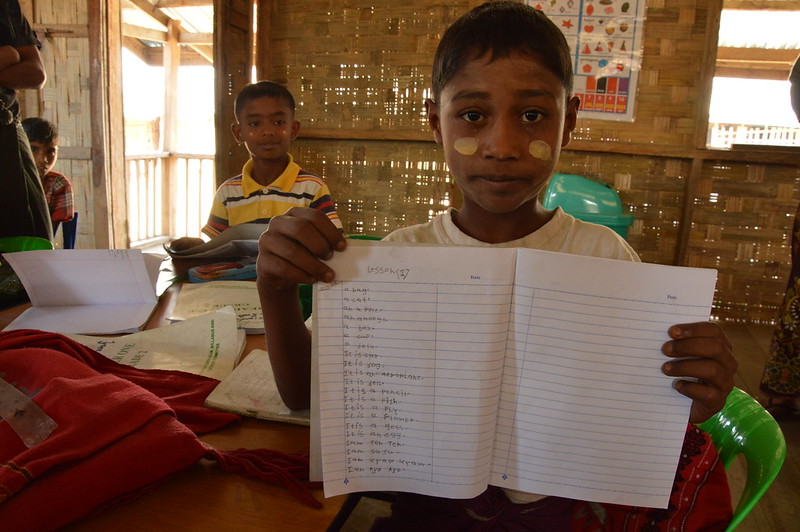The Rohingya crisis reached its height in August of 2017, with hundreds of thousands of Rohingya muslims facing serious danger in their home region of Rakhine State of Burma (also known as Myanmar). The Rohingya are a muslim ethnic minority group living in Burma, residing amongst other minority religious groups and the majority group of Buddhists. Despite many years of discrimination and abuse against the Rohingya, the present day crisis began in 2016, when nine border police were killed. The Burmese government blamed these deaths on what they called ‘armed violent Rohingya groups’ and this ensued an influx of Burmese officials into the Rakhine region. During this time government officials carried out numerous acts of violence, sexual exploitation, and an array of human rights violations. This caused thousands of Rohingya to flee their homes and to seek refuge in neighbouring countries. As of today, approximately 920,000 Rohingya are living in Kutupalong and Nayapara refugee camps in the Cox’s Bazar region of Bangladesh.
Nearly 60 percent of the Rohingya refugees are children, relying on humanitarian aid and the decisions from the Bangladesh government to meet their basic rights of food, shelter, water, and education. Unfortunately, access to adequate educational opportunities has come under increasing risk recently, since the Bangladesh government forcibly closed the community schools that supported these refugee children. Since the thousands of Rohingya refugees came to Bangladesh, the government has been adamant that they would soon return to Burma. For the last five years, this declaration has prohibited the construction of any permanent schools. Thus, Rohingya children living in refugee camps have had to get their education from community schools or learning centres that have been created and run by non-governmental organizations (NGOs) such as Amnesty International. The curriculum from these community schools is not accredited, meaning that Rohingya children will have no accreditation in regards to their education.
This already dire situation was made worse in December 2019, when the Bangladesh government decided to forcibly close all community-led schools in the Cox’s Bazar region, in which majority of the refugee camps are located. A decision that violates the right to education as outlined in the Universal Declaration of Human Rights (UDHR), on a massive scale. The decision came with little explanation from Bangladesh officials, who are a signatory of the UDHR, which they are violating. However, many Rohingya activists and advocates believe the reasoning is related to the Bangladesh government’s plan to move all Rohingya refugees to the remote, flood-prone island of Bhasan Char.
This leaves Rohingya children with a disadvantaged level of education. The government of Bangladesh is also strongly against the integration of Rohingya children into the Bangladesh school system. Thus, Rohingya refugee children are left either with no education, or whatever informal efforts are made available by volunteers in refugee camps. This is even more uncertain than the previous community schools. Without proper, ensured, access to education, thousands of children will be at an increased risk of trafficking, forced labour, and forced child marriages.
Education is a basic human right that should be ensured for all children. It has long been seen as the most beneficial investment of time, and is a powerful tool that can help lift young individuals out of poverty,creating a future of opportunities. Therefore, it is incredibly important for the international community, as well as Canada, to take action.
First and foremost, Canada and top government officials need to publicly speak on the issue and encourage the Bangladesh government to reopen community schools. If Canada and other countries put pressure on the Bangladesh government, there is a much higher chance that proper access to education will be obtainable. Furthermore, the Canadian government should work together with other governments, intergovernmental committees, and NGOs to provide humanitarian aid for community members and volunteers in Cox’s Bazar refugee camps, to be able to provide proper educational opportunities for Rohingya children. Additionally, Canada should be working with the European Union and the United Nations, both of whom have committed to educational access as a right in past years, working to create accredited programs in community schools. This will allow genuine future opportunities for Rohingya children with proper recognition of their education.
Edited by Riyana Karim Hajiani

Olivia is in her fourth year at McGill University. Since transferring from the B.Ed. kindergarten and elementary program she is currently majoring in International Development studies with a minor in Education. As a staff writer she publishes articles on issues relating to international development, with a particular interest in human rights, climate change, and health care.

